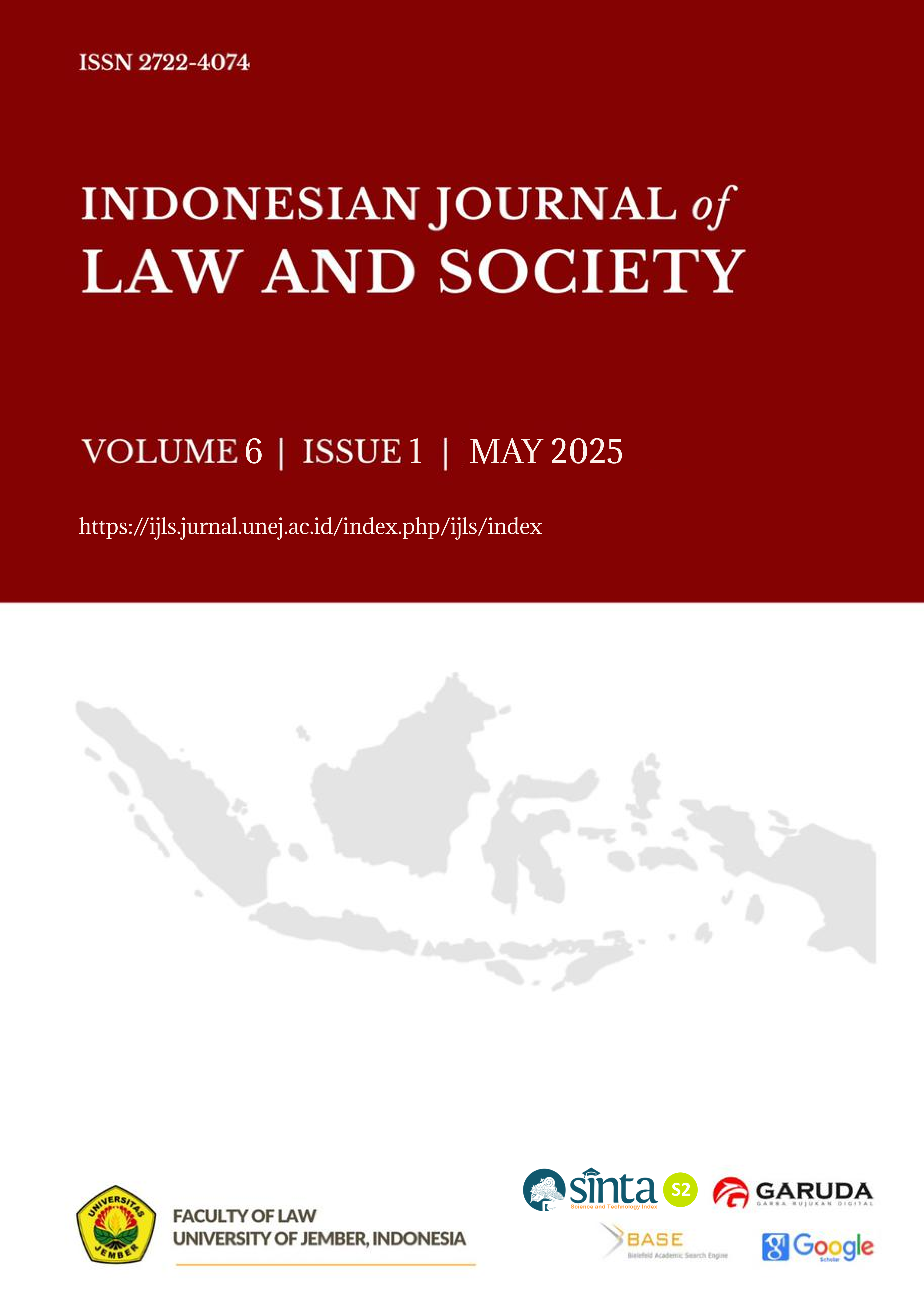State, Religion, and Symbolic Violence
Religious Discrimination and Intolerance in Indonesia
DOI:
https://doi.org/10.19184/ijls.v6i1.53714Abstract
ABSTRACT:
This paper explores the role of the state in Indonesia in perpetuating symbolic violence against religious minorities, as well as how the suppression of religious activities illustrates the state's failure to uphold its constitutional commitment to religious freedom. Motivated by the increasing incidents of discrimination and intolerance perpetrated by both the public and state authorities, this study aims to identify and critically analyze the mechanisms through which symbolic violence is enacted, the neglect of minority protections, and the legal rhetoric employed to legitimize such actions. Using a qualitative methodology that combines normative legal analysis with a critical sociological perspective, this research examines legislation, legal doctrines, and illustrative case studies. It draws on Pierre Bourdieu’s theory of symbolic violence, Karen Armstrong’s theory of aggression, as well as the principles of strict scrutiny and the conceptual distinction between 'security' and 'safety' as outlined in the ICCPR framework. The findings reveal that the state, both actively and passively, contributes to the production and normalization of symbolic violence, often yielding to majoritarian pressures and invoking 'public order' to curtail religious freedoms. Despite ratifying the ICCPR, Indonesia has not fully internalized its principles into national law, resulting in ambiguous human rights protections. This paper concludes that without structural reforms and a firm commitment to secular legal principles, the future of pluralism in Indonesia remains at risk.
KEYWORDS: Symbolic Violence, Freedom of Religion or Belief, Intolerance, Pluralism
Downloads
References
Constitution of the Republic of Indonesia 1945.
Joint Regulation of the Minister of Religion and the Minister of Home Affairs Number 8 and Number 9 of 2006 (Regulation on the Establishment of Houses of Worship in 2006), Joint Regulation 2006.
Law Number 1 of 2023 concerning the Criminal Code, Criminal Code 2023.
Law of the Republic of Indonesia Number 12 of 2005 on the Ratification of the International Covenant on Civil and Political Rights, 2005.
Armstrong, Karen;, Berperang Demi Tuhan ; Fundamentalisme dalam Islam, Kristen, dan Yahudi (Bandung: Mizan, 2013).
Armstrong, Karen, Fields of Blood: Religion and the History of Violence (New York: Knopf, 2014).
Bakunin, MIkhail, God and State (New York: Dover Publications, 2003).
Benedek (juriste), Wolfgang & Matthias C Kettemann, Freedom of Expression and the Internet (Strasbourg: Council of Europe Publishing, 2020).
Bourdieu, Pierre, Language and Symbolic Power (Harvard University Press, 1991).
———, Masculine Domination (Stanford: Stanford University Press, 2001).
———, Renungan Pascalian (Yogyakarta: Kreasi Wacana, 2016).
Bourdieu, Pierre & Jean-Claude Passeron, Reproduction in Education, Society and Culture (London: SAGE Publications, 1979).
Chemerinsky, Erwin, Constitutional Law: Principles and Policies (New York: Wolters Kluwer, 2015).
Cotterrell, Roger, Law, Culture and Society: Legal Ideas in the Mirror of Social Theory (Ashgate Publishing, Ltd., 2006).
Dworkin, Ronald, Law’s Empire (Cambridge: Harvard University Press, 1986).
———, Taking Rights Seriously (Cambridge: Harvard University Press, 1977).
Foucault, Michel, Discipline and Punish: The Birth of the Prison (New York: Pantheon Books, 1977).
Friedman, Lawrence M, Sistem Hukum : Perspektif Ilmu Sosial (Bandung: Nusamedia, 2009).
Hefner, Robert W, Civil Islam: Muslims and Democratization in Indonesia (Princeton: Princeton University Press, 2011).
Hirschl, Ran, Constitutional Theocracy (Cambridge: Harvard University Press, 2010).
Hurd, Elizabeth Shakman, The Politics of Secularism in International Relations, 105 (Princeton: Princeton University Press, 2008).
Kennedy, Duncan, A Critique of Adjudication: Fin de Siècle (Harvard University Press, 1997).
Khanif, Al, Religious Minorities, Islam and the Law: International Human Rights and Islamic Law in Indonesia (London: Routledge, 2020).
Komnas HAM, Panduan Prinsip dan Strategi Penguatan Toleransi dan Pluralisme dalam Rangka Pemajuan HAM di Indonesia (Jakarta: Komnas HAM, 2021).
Latif, Yudi, Negara paripurna: historisitas, rasionalitas, dan aktualitas Pancasila (Jakarta: Gramedia Pustaka Utama, 2011).
Lindsey, Tim & Helen Pausacker, eds, Religion, Law and Intolerance in Indonesia (London: Routledge, 2016).
Mahkamah Konstitusi Republik Indonesia;, Naskah Komprehensif Perubahan Undang-Undang Dasar Negara Republik Indonesia Tahun 1945: Buku VIII Warga Negara dan Penduduk, Hak Asasi Manusia dan Agama, revisi ed (Jakarta: Sekretariat Jenderal dan Kepaniteraan Mahkamah Konstitusi, 2010).
MD, Moh Mahfud, Membangun Politik Hukum Menegakkan Konstitusi (Jakarta: Rajawali Pers, 2011).
Menchik, Jeremy, Islam and Democracy in Indonesia: Tolerance without Liberalism (Cambridge: Cambridge University Press, 2016) Cambridge Studies in Social Theory, Religion and Politics.
Minow, Martha, Not Only for Myself: Identity, Politics, and the Law (New York, London: The New Press, 1999).
Naʻīm, ʻAbd Allāh Aḥmad, Islam and the secular state: negotiating the future of Shariʻa (Cambridge: Harvard University Press, 2008).
Nussbaum, Martha C, Liberty of conscience: in defense of America’s tradition of religious equality (New York: Basic Books, 2008).
Rawls, John, Political Liberalism (New York: Columbia University Press, 1993).
Salim, Arskal, Challenging the Secular State: The Islamization of Law in Modern Indonesia (Honolulu: University of Hawaii Press, 2008).
Sitompul, Rinto, M Ridwan & Yusniar Lubis, Pelindungan Hukum Masyarakat Minoritas dalam Konteks Kebebasan Beragama (Medan: Pestaka Bangsa Press, 2023).
Steiner, Henry J, Philip Alston & Ryan Goodman, International Human Rights in Context: Law, Politics, Morals : Text and Materials (Oxford University Press, 2008).
Swartz, David, Culture and Power: The Sociology of Pierre Bourdieu (Chicago: University of Chicago Press, 1997).
Taylor, Charles, Multiculturalism and “The Politics of Recognition”: An Essay (Princeton: Princeton University Press, 1992).
Toha, Anis Malik, Tren pluralisme agama: tinjauan kritis (Jakarta: Perspektif, 2005).
Unger, Roberto Mangabeira, The Critical Legal Studies Movement (Cambridge: Harvard University Press, 1986).
Wahid, Abdurrahman, Muslim Di Tengah Pergumulan (Leppenas, 1981).
Alfian, Andi, “Kekerasan Simbolik dalam Wacana Keagamaan di Indonesia” (2023) 18:1 Al-Adyan: Jurnal Studi Lintas Agama 25–50.
Aspinall, Edward & Marcus Mietzner, “Southeast Asia’s Troubling Elections: Nondemocratic Pluralism in Indonesia” (2019) 30:4 Journal of Democracy 104–118.
Bourdieu, Pierre, “The Force of Law: Toward a Sociology of the Juridical Field” (1987) 38:5 UC Law Journal 814.
Dzakie, Fatonah, “Meluruskan Pemahaman Pluralisme dan Pluralisme Agama di Indonesia” (2014) 9:1 Al-Adyan 79–94.
Effendi, Djohan, “Dialog Antar Agama: Bisakah Melahirkan Teologi Kerukunan” (1978) 16 Prisma.
Fallon Jr, Richard H, “Strict Judicial Scrutiny” (2007) 1267–1337.
Feldman, David, “Human Dignity as a Legal Value: Part II” (2000) 1 Public law 61–76.
Hakim, Riza Abdul, “Agama, Identitas, dan Kewargaan: Problematika Hukum dan Sentimen Anti Minoritas di Terban” (2016) 5:2 IN RIGHT: Jurnal Agama dan Hak Azazi Manusia 256–297.
Human Rights Watch, “Indonesia: New Criminal Code Disastrous for Rights” (8 December 2022), online: <https://www.hrw.org/news/2022/12/08/indonesia-new-criminal-code-disastrous-rights>.
———, World Report 2023: Freedom of Belief and Expression, by Human Rights Watch (New York: Human Rights Watch, 2023).
Imparsial, Laporan Universal Periodic Review 2017–2021: Hak Beragama dan Berkeyakinan, by Imparsial (Jakarta: Imparsial, 2022).
International Commission of Jurists, The Siracusa Principles on the Limitation and Derogation Provisions in the ICCPR (1984).
SETARA Institute, Laporan Tahunan Kebebasan Beragama dan Berkeyakinan di Indonesia 2023, by SETARA Institute (Jakarta: SETARA Institute, 2024).
SETARA Institute for Democracy and Peace, Rilis Data Kondisi Kebebasan Beragama Berkeyakinan (KBB) 2024: Regresi di Tengah Transisi, by SETARA Institute for Democracy and Peace (Jakarta: SETARA Institute for Democracy and Peace, 25 May 2025).
UN Human Rights Committee, General Comment No. 22: The Right to Freedom of Thought, Conscience and Religion, by UN Human Rights Committee, UN Doc CCPR/C/21/Rev.1/Add.4 (United Nations, 1995).
———, General Comment No. 31: The Nature of the General Legal Obligation Imposed on States Parties to the Covenant (2004).
United Nations Development Programme (UNDP), Human Rights-Based Approaches to Development Programming, by United Nations Development Programme (UNDP) (United Nations Development Programme, 2006).
Wahid Institute, Laporan Tahunan Kebebasan Beragama dan Berkeyakinan di Indonesia 2022, by Wahid Institute (Jakarta: Wahid Institute, 2023).
Downloads
Published
Issue
Section
License
Copyright (c) 2025 Indonesian Journal of Law and Society

This work is licensed under a Creative Commons Attribution 4.0 International License.
The Indonesian Journal of Law and Society has CC-BY-SA or an equivalent license as the optimal license for publishing, distributing, using, and reusing scholarly work. Authors who publish with this journal retain copyright and grant the journal right of first publication with the work simultaneously licensed under a Creative Commons Attribution-ShareAlike 4.0 International License that allows others with permission from the publisher to share the work with an acknowledgment of the work's authorship and initial publication in this journal.












